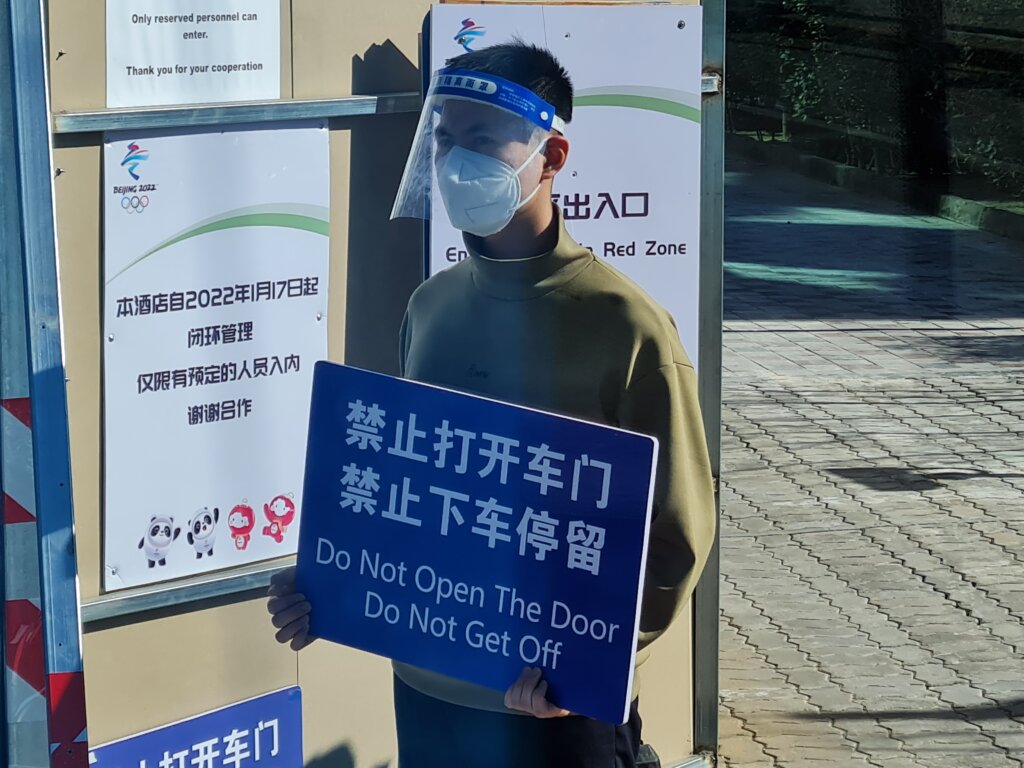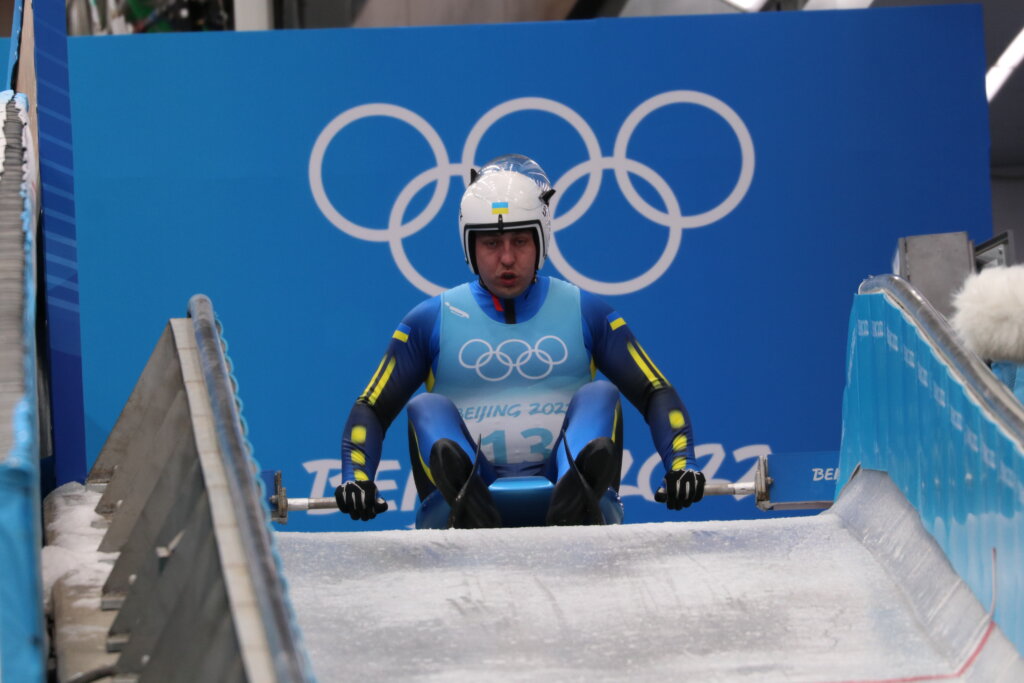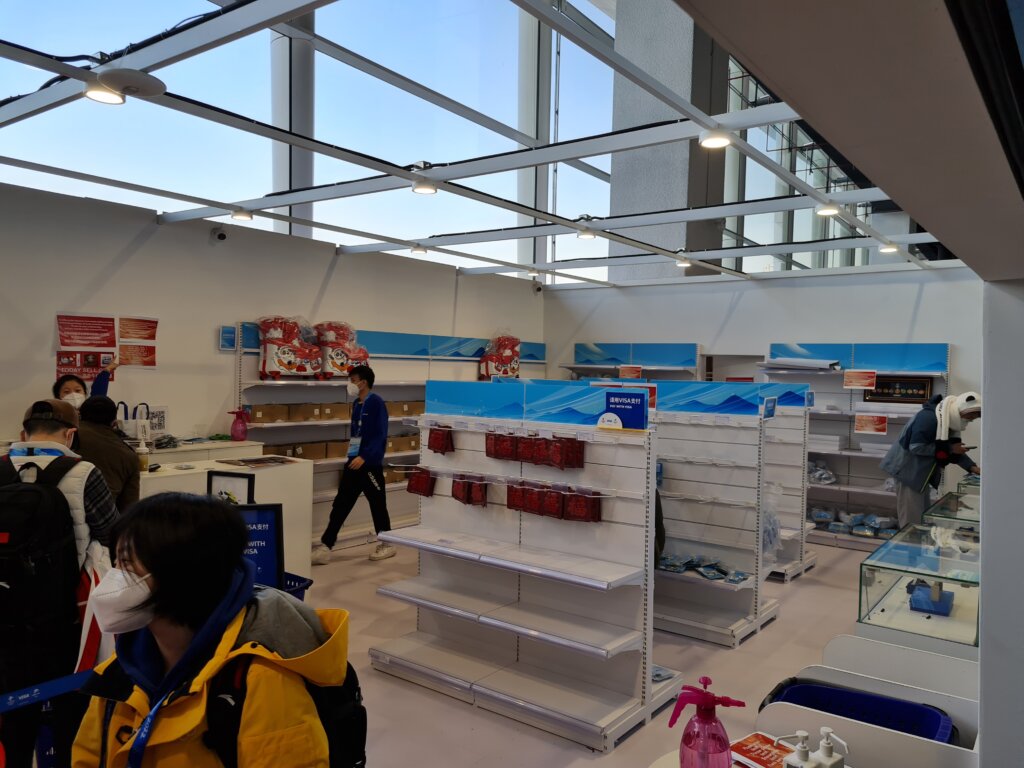From positive COVID tests and Russian provocations to hours-long “20-minute train rides” and the scarcity of Olympic mascot Bing Dwen Dwen, life “inside the loop” at Beijing is unlike anything you’ve imagined.
Together for a Shared Future. It’s the ubiquitous motto of the Beijing 2022 Winter Olympics and it can be seen everywhere inside the Beijing bubble.
Has there been a more ironic Olympic tagline? Two things that are certainly not permitted inside this vaunted “closed loop” are being ‘together’ – and sharing.
Five-star hotels are barricaded and protected by round-the-clock security to ensure no unauthorised entry or exit. State-of-the-art venues are surrounded by high walls, preventing press and officials from walking between venues located mere meters apart.
The famous Olympic condoms provided to Olympians come with an asterisk – “please refrain from using until you return home after the Beijing 2022 Olympic Games”.
There are many feelings among the Ukrainians here in the Beijing bubble; but being together and sharing are not among them.

A Chinese volunteer “outside the loop” holds a sign to passengers of a press bus about to enter a gated hotel to remind them they are not permitted to exit the bus.
COVID Costs Team Ukraine
As COVID rates continue to set records back home and Beijing 2022 scrambles to ensure the Omicron variant doesn’t spread through the “closed loop”, I suppose it was inevitable Ukrainian athletes would face positive COVID tests.
That said, it’s been a tough first week.
First, Olena Bilosyuk, the captain of Ukraine’s Olympic biathlon team tested positive, forcing her to miss the mixed relay and individual events.
Then, Ivan Shmuratko was forced to pull out of the Team Figure Skating event after a positive test of his own.
At least two more Ukrainian athletes have received positive tests since, meaning 4 out of 45 Ukrainian athletes – nearly 10% – have at least one positive COVID test in the first week of Beijing 2022.
Ukrainian coaches and officials have also tested positive (although we Ukrainian press haven’t yet been affected).
While reactions to Chinese food rations vary among athletes from nation to nation, most have griped about the lack of training opportunities.
In an exclusive interview with The Kyiv Post, Lviv luger Andriy Mandziy complained about the cost of a single positive test.
“I was asymptomatic, but they wouldn’t let me train“
he told the Kyiv Post.
“They only gave me three training runs before competing. They could have maybe let me practice at night, after the other athletes had left. This would have really helped.”
Mandziy performed quite well, but a fall in his first run – just his fourth time down the track – meant he missed qualifying for the final round.

Games, Trains & Automobiles
Two things that matter to press when covering large sporting events like the Olympic Games are press facilities and transportation.
Beijing 2022 has some excellent press facilities. The organisation of transportation, however, has left a lot to be desired.
China opened its brand-new Olympic bullet train in January – just three years after construction began.
The self-driving trains can reach speeds of up to 350 km/h and were designed to dramatically cut the travel time from Beijing to the mountain clusters – from 4.5 hours to less than an hour to Zhangjiakou, and from 1.5 hours to 20 minutes to Yanqing.
The trains have done just that.
Unfortunately, byzantine transport hubs located in both mountain clusters and Beijing itself turns a 20-minute ride to Yanqing into a 4+ hour adventure. It’s no better in Zhangjiakou.
It’s like flying from Kyiv to London and back – to watch luge.
As one Ukrainian photographer lamented to me about the long hikes to ‘transportation hubs’ in the middle of nowhere,
“The Chinese built all these nice new mountain highways – they need someone to see them!”
The closed-loop system is creating all kinds of travel headaches.
Buses don’t just pull up beside venues and hotels – they must wait for a gate to open before proceeding. And for it to close before loading and unloading. And for it to reopen before leaving again. This turns a 30-second stop into a five to ten-minute ‘rest break’. This adds up with multiple stops on routes.
This is the case even if venues are located directly beside each other, like the “Ice Cube”, where curling takes place and the “Fan”, home to women’s and men’s hockey.
It creates some pretty entertaining optics – like in ‘The Simpsons’, when Bart and Lisa are whisked away from home in a child protective services van, only to be dropped off – immediately – at their neighbours’ house.
Politics & Provocations
Against the explicit wishes of the IOC – and a direct appeal by UN Secretary General António Guterres for peace – politics is an ever-present aspect to this unique Olympic Games.
When you start the event with a summit with an allied nuclear power, after which you release a joint statement that is entirely political in nature, I guess that is bound to happen. Especially when one of the nuclear powers is openly hinting at invading another Olympic nation – perhaps even during these Olympic Games.
Ukrainian athletes were told to expect political provocations. In fact, they were even briefed before arrival on how to interact with Russian athletes and press.
But it came to a head quickly. Even before the Opening Ceremonies kicked off the 24th Winter Olympiad, Ukrainian athletes were forced to fend off repeated questions on language and politics from Russian reporters.
Ivan Shmuratko was questioned by Russian reporters before competition even began. He was disappointed in how the Russian media presented his comments.
“I really didn’t like the way you pulled out my words”, he told Russian publication Sport-Express.ru in an interview.
“You [Russian publication sport-express.ru] wrote ‘Ukrainian speakers do not speak [Russian]. I didn’t say that. I said that I am a Ukrainian figure skater. I speak Ukrainian and English, because there is international press here. If you have questions about figure skating or about me, I am open. If you need me to hype … [I’ll disengage].”
As you may have heard, one notorious Russian entertainer and provocateur even staged an incident with yours truly – brazenly posting the attack online minutes afterward, despite flaunting the prohibited Russian colours and symbols on his back at the time.
This was just hours before athletes from his country walked into the “Bird’s Nest” Stadium with the Russian flag on their uniforms – in direct violation of whatever teeth the initial Court of Arbitration for Sport (CAS)-upheld sanctions remained.
The IOC and Beijing 2022 have stayed strangely silent.
One wonders what their reaction would be like if it were [non-Olympic sponsors] like Pepsi or Mastercard that had staged a guerilla marketing stunt like this.
As tensions between Ukraine and Russia remain high back home, so, too, do they inside the Beijing bubble.
“We’re not the best of friends. We spend time with our own team. We’re not in contact with the Russians.“
Ukrainian bobsledder and former world strongwoman runner-up Lidiia Hunko told Reuters.
“The situation [Russian military build-up along Ukraine’s borders] affects us because we all have family, we all have friends there. Of course, we treat people as separate individuals, but it still leaves a mark.”

Supply & Demand
To say that the Olympic souvenir store at the Main Press centre is popular is like saying rush hour traffic in Kyiv is bad – true, but massively understated.
Since the Opening Ceremonies, lines have seen up to 400 people, with waiting times as long as getting out to the mountain venues (4+ hours).
The adorable panda mascot Bing Dwen Dwen is as hard to find as blossoming fern on Ivana Kupala Day.
It’s the Chinese themselves that are ringing the registers, picking up as much of anything left in the store as possible. Which had me wondering – could the Chinese even buy Beijing 2022 products outside the bubble?
The answer is yes, but not for very long.
Physical outlets started selling the swag only in September, and online merchandise became available only in January. But no-one was paying attention then.
“Nobody cared about the Olympics until the Opening Ceremonies”, said Wei, a Beijing 2022 volunteer, with her colleagues nodding along in agreement.
“Now everyone wants a piece of the Olympics – and Bing Dwen Dwen is so cute!”
Just three days into Beijing 2022 and the souvenir shelves have already been picked thin. The shelves that aren’t yet bare sport such popular items as neon orange backpacks and magnets without the Beijing 2022 logo.
The management of supply, of course, is nothing new for China’s communist government.
In the run-up to these Olympic Games, China banned all commercial flights to Beijing, requiring athletes, officials, and press to fly in on a limited number of charter flights. The lack of supply skyrocketed flight prices, with jumps of more than 250% being commonplace.
Limited supply of hotels also saw room rates jump over 250%, although increased room rates were an Olympic norm long before the words “closed loop” and “Bing Dwen Dwen” became part of our vocabulary.
Speaking of Bing Dwen Dwen – if you find a plush toy of the adorable panda, please drop me a line. I know several hundred journalists that would pay top dollar for one right now.
